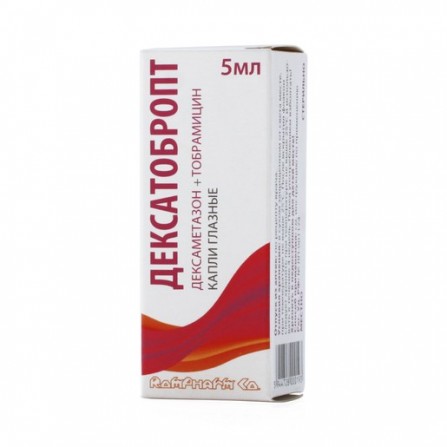More info
Active ingredients
Dexamethasone + Tobramycin
Pharmacological effect
GKS for local use in ophthalmology. It has a pronounced anti-inflammatory, antiallergic and antiexudative effect. Interacting with specific protein receptors in target tissues, it regulates the expression of corticoid-dependent genes and thus affects protein synthesis. Reduces the formation, release and activity of inflammatory mediators (including histamine, kinin, prostaglandins, lysosomal enzymes). Suppresses cell migration to the site of inflammation. Reduces vasodilation and increased vascular permeability in the inflammation. Stabilizes lysosomal enzymes of leukocyte membranes. Suppresses the synthesis of antibodies and violates the recognition of antigen. It inhibits the release of interleukin 1 and interleukin 2, interferon-лимф from lymphocytes and macrophages. Induces the formation of lipocortin, inhibits the release of inflammatory mediators by eosinophils and stabilizes the membranes of mast cells. All of these effects are involved in suppressing the inflammatory response in the tissues in response to mechanical, chemical or immune damage. The duration of the anti-inflammatory effect of the drug after instilling 1 drop of solution is from 4 to 8 hours.
Use during pregnancy and lactation
The use of the drug during pregnancy during lactation (breastfeeding) is contraindicated.
Side effects
Basically the drug is well tolerated. Local reactions: immediately after instillation of the drug, perhaps a quickly passing sensation of burning, tearing, blurring of vision. With prolonged use of the drug (more than 2 weeks), it is possible to increase intraocular pressure, develop glaucoma with damage to the optic nerve, decrease visual acuity and loss of visual fields, as well as the formation of posterior subcapsular cataract, thinning and perforation of the cornea. very rarely - the spread of herpes and bacterial infections. Patients with hypersensitivity to dexamethasone or benzalkonium chloride may develop allergic conjunctivitis and blepharitis. It is possible the development of itching, palpebral or conjunctival erythema.When corneal or scleral ulcers appear, the drug can slow down healing and promote the development of re-infection. With prolonged use may increase the risk of systemic side effects characteristic of GCS. On the part of the endocrine system: reduced glucose tolerance, steroid diabetes mellitus or manifestation of latent diabetes, adrenal suppression, Itsenko-Cushing syndrome. On the part of the digestive system: nausea, vomiting, increased or decreased appetite, exacerbation of chronic diseases of the gastrointestinal tract. Since the cardiovascular system: arrhythmia, bradycardia, increased blood pressure. On the part of the central nervous system: increased intracranial pressure, nervousness or anxiety, insomnia, dizziness, headache.
special instructions
Basically the drug is well tolerated. Local reactions: immediately after instillation of the drug, perhaps a quickly passing sensation of burning, tearing, blurring of vision. With prolonged use of the drug (more than 2 weeks), it is possible to increase intraocular pressure, develop glaucoma with damage to the optic nerve, decrease visual acuity and loss of visual fields, as well as the formation of posterior subcapsular cataract, thinning and perforation of the cornea. very rarely - the spread of herpes and bacterial infections. Patients with hypersensitivity to dexamethasone or benzalkonium chloride may develop allergic conjunctivitis and blepharitis. It is possible the development of itching, palpebral or conjunctival erythema. When corneal or scleral ulcers appear, the drug can slow down healing and promote the development of re-infection. With prolonged use may increase the risk of systemic side effects characteristic of GCS. On the part of the endocrine system: reduced glucose tolerance, steroid diabetes mellitus or manifestation of latent diabetes, adrenal suppression, Itsenko-Cushing syndrome. On the part of the digestive system: nausea, vomiting, increased or decreased appetite, exacerbation of chronic diseases of the gastrointestinal tract. Since the cardiovascular system: arrhythmia, bradycardia, increased blood pressure.On the part of the central nervous system: increased intracranial pressure, nervousness or anxiety, insomnia, dizziness, headache.





